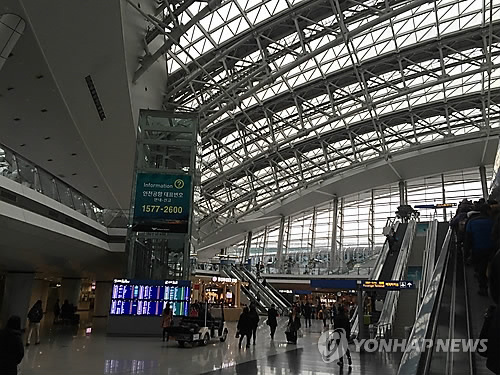South Korea’s parliament has passed a revised bill to prescreen air passengers as part of efforts to block terrorist suspects from entering the country, the Justice Ministry said Thursday.
The National Assembly passed the revision to the immigration control law late on Wednesday. It requires airlines to receive permission from the nation’s immigration office before issuing plane tickets, the ministry said in a press release.
 |
(Yonhap) |
The immigration office will receive a list of passengers from airliners to check in advance whether any passports have been reported lost or are fake. It will then notify the airliners in real time whether they can issue boarding passes for the passengers.
South Korea has been running a pilot prescreening system in a few airports in Japan and China since February 2015, with plans to expand operations into other countries next year.
Growing terrorism risks around the world as well as a series of security breaches at the nation’s largest Incheon International Airport have led to such fortified immigration measures.
The ministry said that through the provisional operation of prescreening, it banned more than 350 people, including sex and drug offenders, from boarding flights bound for South Korea by checking more than a million passengers’ identities in advance.
The revision also requires foreign nationals aged 17 and over, who wish to enter Korea and reside here, to register their facial information and finger prints with the immigration office.
The bill will also enforce punishment for foreigners who submit false documents or illegally lend their foreigner registration identification cards to others. Lawbreakers can face penalties of up to 20 million won ($16,454), a jail term of up to three years and deportations.
The validity period of travel documents for recognized refugees will also be extended to three years to make it easier for them to come in and out of the country.
Under the revision, procedures to make changes to foreigners’ home addresses in the country will be simplified. They can now register their addresses at community centers.
“Through the revision, we expect that the ministry can provide better services for passengers entering and leaving Korea, while guaranteeing safety but preventing possible terrorist attacks,” the ministry said.
In a separate move, the Assembly also passed a counter-terrorism bill that will allow the nation’s spy agency to collect potential terrorists’ information through their private communications and financial transactions.
In February, a man was caught days after leaving a bomb-like box and a threat note inside a restroom at Incheon International Airport. In January, a Chinese couple and a Vietnamese were apprehended after illegally sneaking into the country through the airport.
By Ock Hyun-ju (
laeticia.ock@heraldcorp.com)







![[Today’s K-pop] Blackpink’s Jennie, Lisa invited to Coachella as solo acts](http://res.heraldm.com/phpwas/restmb_idxmake.php?idx=644&simg=/content/image/2024/11/21/20241121050099_0.jpg)
